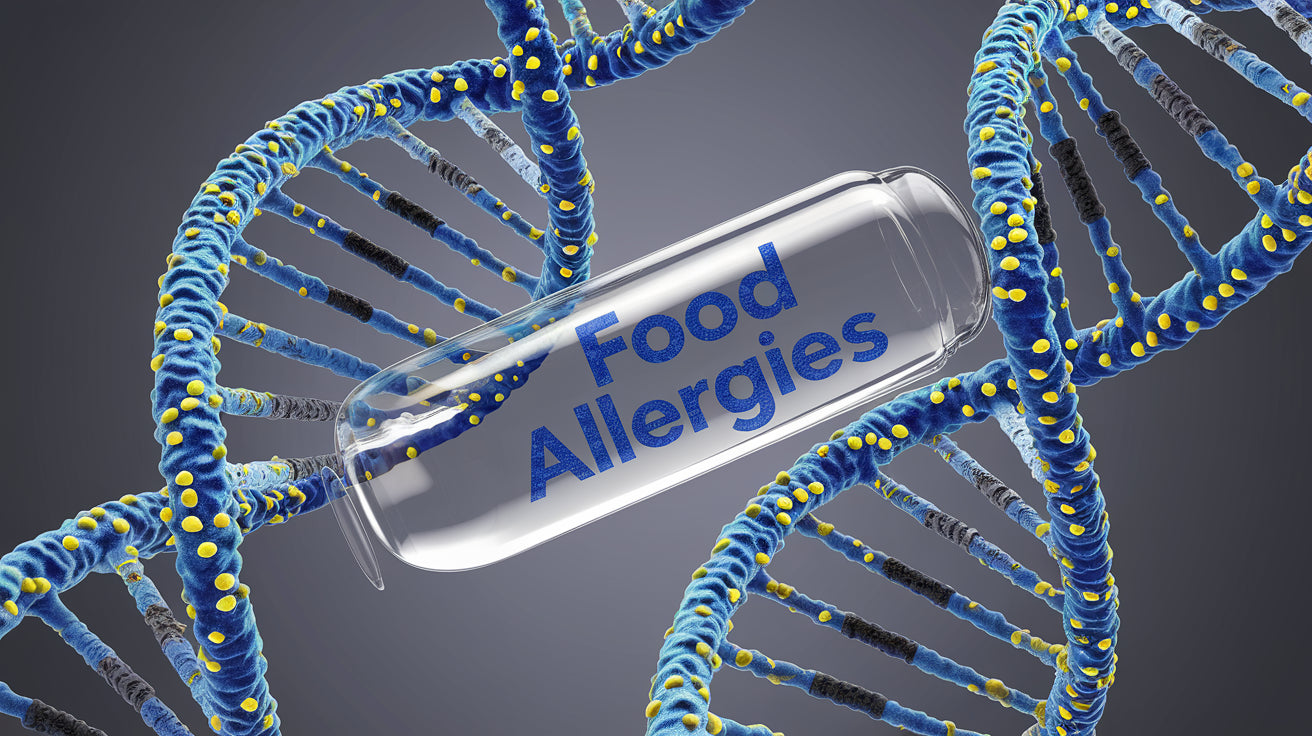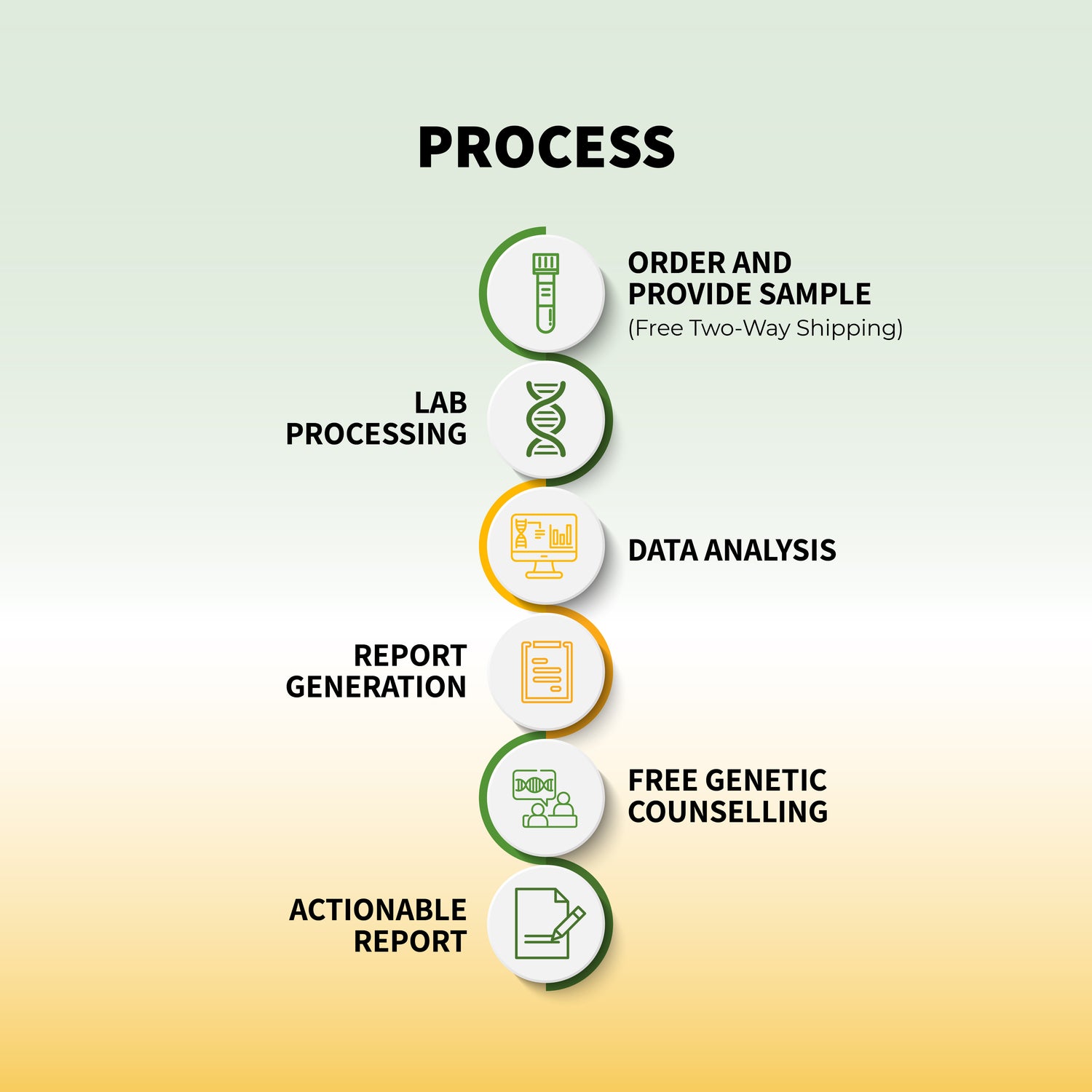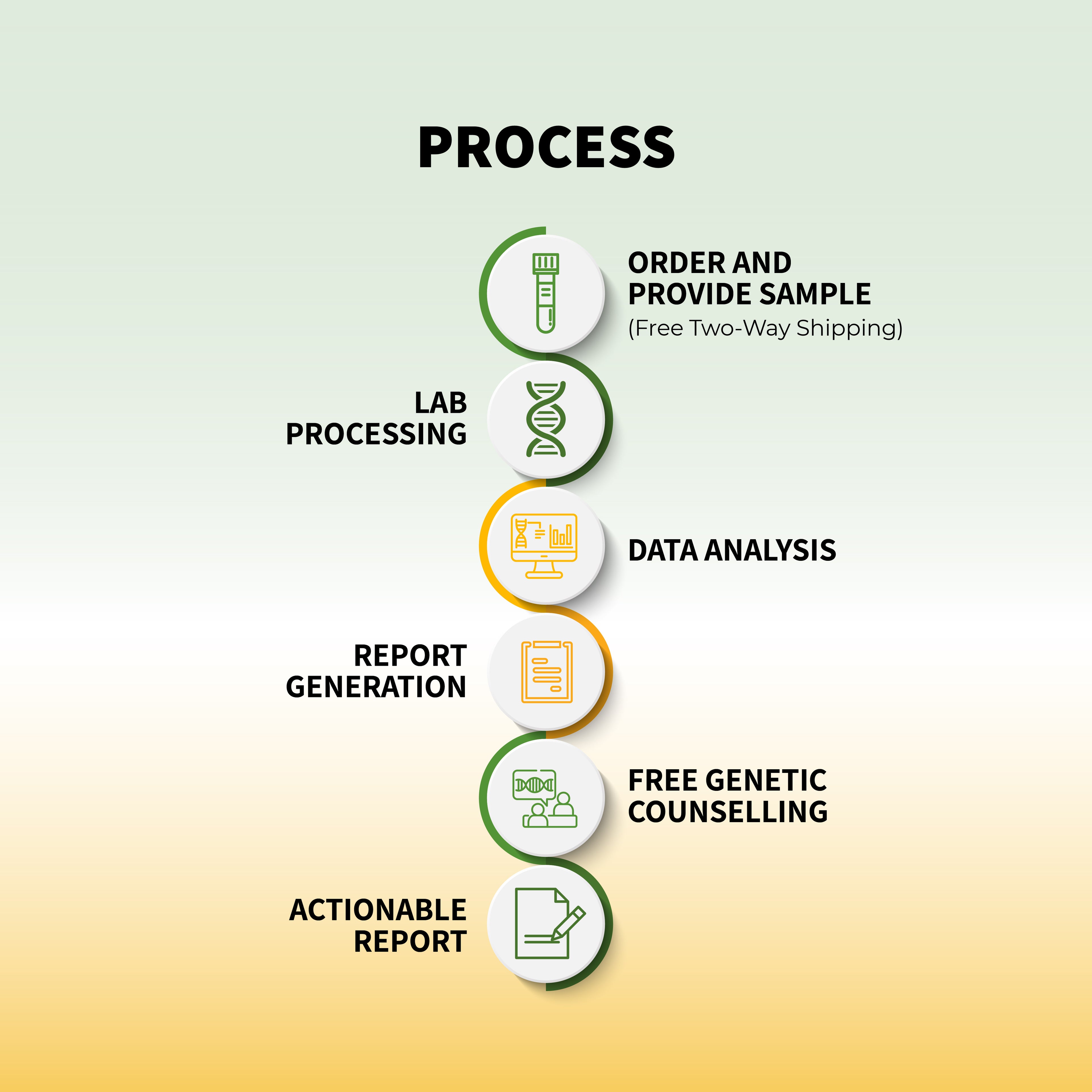खाद्य एलर्जी और संवेदनशीलता दुनिया भर में लाखों लोगों को प्रभावित करती है, जिससे असुविधाजनक और संभावित रूप से खतरनाक प्रतिक्रियाएं होती हैं। लेकिन क्या होगा अगर इन प्रतिक्रियाओं को समझने की कुंजी आपके डीएनए में है? आनुवंशिक परीक्षण में हाल की प्रगति ने व्यक्तिगत डीएनए विश्लेषण के माध्यम से खाद्य एलर्जी और संवेदनशीलता की पहचान करना संभव बना दिया है। इस ब्लॉग में, हम खाद्य एलर्जी में आनुवंशिकी की भूमिका का पता लगाएंगे और डीएनए परीक्षण आपको कुछ खाद्य पदार्थों के प्रति आपके शरीर की प्रतिक्रियाओं को समझने और प्रबंधित करने में कैसे मदद कर सकता है।
खाद्य एलर्जी को समझना
खाद्य एलर्जी तब होती है जब आपकी प्रतिरक्षा प्रणाली गलती से किसी विशेष खाद्य प्रोटीन को हानिकारक मान लेती है और प्रतिरक्षा प्रतिक्रिया को ट्रिगर करती है। यह प्रतिक्रिया कई तरह के लक्षण पैदा कर सकती है, जिसमें पित्ती या खुजली जैसी हल्की प्रतिक्रिया से लेकर एनाफिलैक्सिस जैसे अधिक गंभीर लक्षण शामिल हैं, जो जानलेवा हो सकते हैं। आम खाद्य एलर्जी में मूंगफली, शंख, दूध और अंडे शामिल हैं, लेकिन कोई भी खाद्य पदार्थ संभावित रूप से एलर्जी प्रतिक्रिया को ट्रिगर कर सकता है।
जबकि खाद्य एलर्जी का निदान आमतौर पर त्वचा चुभन परीक्षण या रक्त परीक्षण के माध्यम से किया जाता है, ये पारंपरिक तरीके कभी-कभी अनिर्णायक हो सकते हैं या विशिष्ट संवेदनशीलता को अनदेखा कर सकते हैं। यह वह जगह है जहाँ आनुवंशिक परीक्षण अधिक सटीक और व्यक्तिगत दृष्टिकोण प्रदान करने के लिए कदम उठाते हैं।
खाद्य एलर्जी के पीछे की आनुवंशिकी
खाद्य एलर्जी अक्सर आनुवंशिक कारकों से जुड़ी होती है। यदि आपके परिवार में एलर्जी या अन्य प्रतिरक्षा-संबंधी स्थितियों का इतिहास है, तो खाद्य एलर्जी विकसित होने का जोखिम काफी अधिक है। कुछ जीन प्रतिरक्षा प्रणाली प्रतिक्रियाओं को प्रभावित करने के लिए जाने जाते हैं, और इन जीनों में उत्परिवर्तन या भिन्नता आपको खाद्य एलर्जी के प्रति अधिक संवेदनशील बना सकती है।
इसमें शामिल प्रमुख जीनों में से एक है HLA जीन परिवार (ह्यूमन ल्यूकोसाइट एंटीजन), जो इस बात में महत्वपूर्ण भूमिका निभाता है कि आपका प्रतिरक्षा तंत्र विदेशी पदार्थों को कैसे पहचानता है। इन जीनों में भिन्नता से आपको एलर्जी होने की संभावना बढ़ सकती है, जिसमें भोजन से होने वाली एलर्जी भी शामिल है। इसके अलावा, इम्यूनोग्लोबुलिन ई (IgE) के स्तर को नियंत्रित करने वाले जीन - एलर्जी प्रतिक्रियाओं में शामिल एक प्रकार का एंटीबॉडी - कुछ एलर्जी के प्रति आपके शरीर की प्रतिक्रिया को भी प्रभावित कर सकते हैं।
डीएनए परीक्षण से खाद्य एलर्जी की पहचान कैसे की जा सकती है
खाद्य एलर्जी के लिए डीएनए परीक्षण एलर्जी के प्रति बढ़ी हुई संवेदनशीलता से जुड़े विशिष्ट आनुवंशिक मार्करों की पहचान करने पर केंद्रित है। प्रतिरक्षा प्रतिक्रिया से संबंधित जीन में भिन्नता का पता लगाने के लिए एक साधारण लार या रक्त के नमूने का विश्लेषण किया जा सकता है। इन आनुवंशिक कारकों की जांच करके, डीएनए परीक्षण कुछ खाद्य एलर्जी और संवेदनशीलता के प्रति आपकी प्रवृत्ति को प्रकट कर सकते हैं।
खाद्य एलर्जी के लिए आनुवंशिक परीक्षण इस प्रकार कार्य करता है:
-
व्यापक विश्लेषण: परीक्षण आनुवंशिक विविधताओं की जांच करता है जो खाद्य एलर्जी विकसित होने के जोखिम को बढ़ाते हैं। इसमें HLA जीन परिवार और IgE-संबंधित जीन की जांच शामिल है, जो एलर्जी प्रतिक्रियाओं से जुड़े हैं।
-
जोखिम कारकों की पहचान: डीएनए परीक्षण से यह पता लगाया जा सकता है कि क्या आपको ऐसे आनुवंशिक रूपांतर मिले हैं जो आपको खाद्य एलर्जी के प्रति अधिक संवेदनशील बनाते हैं। यह जानकारी प्रारंभिक रोकथाम और प्रबंधन के लिए महत्वपूर्ण हो सकती है।
-
व्यक्तिगत जानकारी: एक बार जब आपकी आनुवंशिक जानकारी का विश्लेषण हो जाता है, तो आपको एक विस्तृत रिपोर्ट प्राप्त होगी जिसमें बताया जाएगा कि आपको किन खाद्य पदार्थों से एलर्जी होने की अधिक संभावना है और संभावित प्रतिक्रियाओं की गंभीरता क्या है। इससे आपको सूचित आहार विकल्प बनाने और हानिकारक एलर्जी से बचने में मदद मिल सकती है।
आनुवंशिक परीक्षण बनाम पारंपरिक खाद्य एलर्जी परीक्षण
पारंपरिक खाद्य एलर्जी परीक्षण विधियाँ, जैसे कि त्वचा चुभन परीक्षण और रक्त परीक्षण, एलर्जी का निदान करने के लिए व्यापक रूप से उपयोग की जाती हैं, लेकिन उनकी सीमाएँ हैं। ये परीक्षण एलर्जी के प्रति आपके शरीर की तत्काल प्रतिक्रिया को मापते हैं, लेकिन वे अंतर्निहित संवेदनशीलता को नहीं पकड़ सकते हैं जो तत्काल लक्षणों को ट्रिगर नहीं करते हैं। इसके अतिरिक्त, वे यह नहीं बता सकते हैं कि क्या आपके पास कुछ एलर्जी के लिए आनुवंशिक प्रवृत्ति है जो अभी तक विकसित नहीं हुई है।
इसके विपरीत, आनुवंशिक परीक्षण आपके शरीर की संभावित एलर्जी प्रतिक्रियाओं की गहरी समझ प्रदान करता है। खाद्य एलर्जी से जुड़े आनुवंशिक मार्करों की पहचान करके, आप एलर्जी विकसित होने के अपने दीर्घकालिक जोखिम के बारे में जानकारी प्राप्त कर सकते हैं, भले ही आप वर्तमान में लक्षण अनुभव न कर रहे हों। यह जानकारी आपको अपने स्वास्थ्य को प्रबंधित करने के लिए सक्रिय कदम उठाने में सक्षम बना सकती है।
क्या डीएनए परीक्षण खाद्य असहिष्णुता में सहायक हो सकता है?
जबकि खाद्य एलर्जी में प्रतिरक्षा प्रणाली की प्रतिक्रिया शामिल होती है, खाद्य असहिष्णुता आपके शरीर की कुछ खाद्य पदार्थों को ठीक से पचाने में असमर्थता से संबंधित होती है। इसका एक सामान्य उदाहरण लैक्टोज असहिष्णुता है, जो तब होता है जब आपके शरीर में लैक्टोज को तोड़ने के लिए आवश्यक एंजाइम की कमी होती है, जो डेयरी उत्पादों में पाई जाने वाली एक चीनी है। खाद्य असहिष्णुता से पेट फूलना, गैस और दस्त जैसे असुविधाजनक पाचन लक्षण हो सकते हैं।
आनुवंशिक परीक्षण एंजाइम उत्पादन के लिए जिम्मेदार जीन का विश्लेषण करके खाद्य असहिष्णुता की पहचान करने में भी मदद कर सकता है। उदाहरण के लिए, डीएनए-आधारित डेयरी असहिष्णुता परीक्षण यह बता सकता है कि क्या आपके पास आनुवंशिक भिन्नताएं हैं जो लैक्टोज को पचाने की आपकी क्षमता को प्रभावित करती हैं। यह आपको यह समझने में मदद कर सकता है कि डेयरी का सेवन करने के बाद पेट में तकलीफ जैसे लक्षण एलर्जी की प्रतिक्रिया के बजाय लैक्टोज असहिष्णुता के कारण हैं या नहीं।
डीएनए-आधारित एलर्जी परीक्षण के लाभ
-
सटीकता और वैयक्तिकरण : पारंपरिक एलर्जी परीक्षणों के विपरीत, आनुवंशिक परीक्षण आपके अद्वितीय आनुवंशिक मेकअप के आधार पर सटीक जानकारी प्रदान करता है। यह व्यक्तिगत दृष्टिकोण सुनिश्चित करता है कि आपको अपने शरीर की ज़रूरतों के अनुरूप विशिष्ट सिफारिशें मिलें।
-
प्रारंभिक पहचान और रोकथाम : यदि आपके परिवार में एलर्जी का इतिहास है, तो आनुवंशिक परीक्षण आपके जोखिम का प्रारंभिक पता लगाने में मदद कर सकता है, जिससे आप संभावित एलर्जी से बचने के लिए निवारक उपाय कर सकते हैं और भविष्य में गंभीर एलर्जी विकसित होने की संभावना को कम कर सकते हैं।
-
मौजूदा एलर्जी का बेहतर प्रबंधन : यदि आपको पहले से ही खाद्य एलर्जी का निदान किया गया है, तो डीएनए परीक्षण आपकी स्थिति में योगदान देने वाले अंतर्निहित आनुवंशिक कारकों को बेहतर ढंग से समझने में आपकी सहायता कर सकता है। यह ज्ञान आहार समायोजन सहित अधिक प्रभावी प्रबंधन रणनीतियों का मार्गदर्शन कर सकता है।
-
छिपी संवेदनशीलता की पहचान : आनुवंशिक परीक्षण से खाद्य पदार्थों की संवेदनशीलता की पहचान की जा सकती है जो तत्काल एलर्जी का कारण नहीं बन सकती हैं, लेकिन सूजन या पाचन समस्याओं जैसे दीर्घकालिक स्वास्थ्य समस्याओं का कारण बन सकती हैं। इन संवेदनशीलताओं की पहचान करके, आप बेहतर आहार विकल्प चुन सकते हैं और ऐसे खाद्य पदार्थों से बच सकते हैं जो आपके स्वास्थ्य के लिए हानिकारक हो सकते हैं।
खाद्य एलर्जी के लिए आनुवंशिक परीक्षण के बाद उठाए जाने वाले कदम
एक बार जब आपको अपने आनुवंशिक परीक्षण के परिणाम मिल जाएं, तो अपनी खाद्य एलर्जी या संवेदनशीलता को प्रबंधित करने के लिए कार्रवाई योग्य कदम उठाना महत्वपूर्ण है:
-
स्वास्थ्य सेवा प्रदाता से परामर्श करें : अपने आनुवंशिक परीक्षण के परिणामों को किसी एलर्जी विशेषज्ञ या स्वास्थ्य सेवा प्रदाता के साथ साझा करें, जो निष्कर्षों की व्याख्या करने और आपकी एलर्जी के प्रबंधन के लिए एक व्यक्तिगत योजना बनाने में मदद कर सकता है।
-
अपने आहार को समायोजित करें : अपने आनुवंशिक परिणामों के आधार पर, एलर्जी और उन खाद्य पदार्थों से बचने के लिए अपने आहार को संशोधित करें जिनके प्रति आप संवेदनशील हैं। उदाहरण के लिए, यदि आपके परिणाम डेयरी असहिष्णुता के जोखिम को इंगित करते हैं, तो आप अपने आहार से डेयरी उत्पादों को कम या खत्म करना चाह सकते हैं।
-
लक्षणों पर नज़र रखें : कुछ खाद्य पदार्थों के सेवन के बाद आपको होने वाली किसी भी एलर्जी या लक्षणों पर नज़र रखें। इससे आपको अपने आहार को बेहतर बनाने और अपनी आनुवंशिक प्रवृत्ति के आधार पर सूचित विकल्प चुनने में मदद मिलेगी।
-
सूचित रहें : चूंकि आनुवंशिकी और खाद्य एलर्जी पर अनुसंधान निरंतर विकसित हो रहा है, इसलिए नवीनतम निष्कर्षों से अवगत रहें, जो आपकी एलर्जी के प्रबंधन में अतिरिक्त जानकारी प्रदान कर सकते हैं।
निष्कर्ष
खाद्य एलर्जी आपके दैनिक जीवन पर महत्वपूर्ण प्रभाव डाल सकती है, लेकिन आनुवंशिकी की भूमिका को समझने से आप अपने स्वास्थ्य पर नियंत्रण रखने में सक्षम हो सकते हैं।















